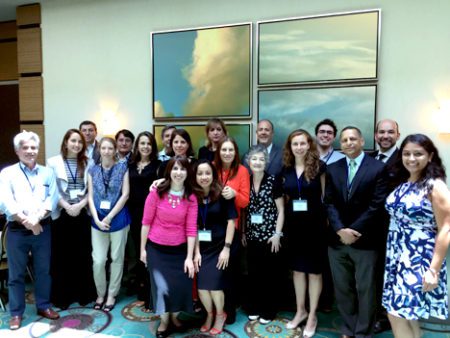As many of you know, The Life Raft Group has developed a sophisticated database to track GIST patients around the world and we have learned many lessons along the way. We have observed first-hand the gap in information as well as access to therapies among patients worldwide. Paired with these issues, there is a lack of disease-specific information that exists among the global medical community, where rare cancers like GIST are infrequently seen. Many physicians assume they know how to treat GIST as a one-size-fits-all approach with a simple prescription of an oral pill. However, as patient advocates, we know that, in order to monitor and treat a rare cancer like GIST, there is much more information necessary to optimize care. In addition to the clinical aspect, the cancer research culture is seeded with competition, and collaboration remains a rarity when sharing data and tissue.
Through discussions with patients, physicians, and others, the LRG identified the need to convene a meeting to discuss how data collection and sharing can be a useful tool across disease groups, institutions, and countries.
If there are ways we can coordinate the collection of empirical data to help clinicians and researchers make informed decisions, this can also help impact our advocacy efforts in these countries. We saw the need to collect smart data to help keep patients with a rare cancer alive!
Collaboration
In collaboration with Alianza GIST, a Latin American GIST coalition (www.alianzagist.net), we organized a two-day meeting called Salud Con Datos (Health with Data) to discuss how we can work together on the collection of data to learn more about our diseases and advance our advocacy efforts. The meeting raised the following questions:
Objective 1:
What is the feasibility of sharing data and cross-collaboration in Latin America?
Objective 2:
What are the elements necessary to make a data set functional?
Objective 3:
What are the roles and responsibilities of each participa nt?
nt?
Twenty representatives from six different countries (Argentina, Brazil, Chile, Mexico, Peru and the United States) were in attendance. Meeting participants included patient advocates, clinicians, researchers, data scientists, and representatives from academia and the pharmaceutical industry.
Participants gained the following from the conference, which showed synchronicity with their pre-meeting expectations:
Collaboration – Connected with different stakeholders and worked to build partnerships and discussed issues regarding health data and availability.
Registries – Viewed best practices of data collection platforms and focused on a proof of concept to test a platform with a dataset in Latin America.
Data – Tackled the issue of patient reported outcomes as an important perspective in data collection and sharing.
As convener of the meeting, the Life Raft Group is pleased with participants’ active involvement and the focused meeting outcomes identified by the group. As we move forward, we plan to expand participation and broaden perspectives by inviting other countries and stakeholders to join in this collaboration to improve health with data in Latin America.




